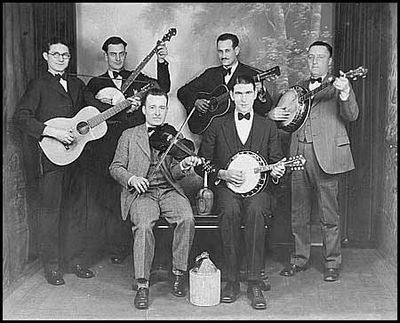Annotation:John Lover's Gone
X: 1 P: John Lover's Gone C: from Bob Mills "Tripping up Stairs" C: arr. T. Traub 9-19-2006 M: 4/4 L: 1/8 K: G |: D2 |"G"G2 G2 B3 B|"C"c2 c2 "D"d2 D2|"G"G2 G2 B d3 d|"C"c2 B2 "D"A2 D2| "G"G2 G2 B3 B|"Am"c2 c2 "G"d2 d2|"C"de d2 "D"cB A2|"G"G4-G2 :| |: ef|"G"gf g2 "D"ag a2 |"G"b2 b2 d3 d|"Am"c2 c2 "G"BA B2|"C"cB c2 "D"d2 ef| "G"gf g2 "D"ag a2 |"G"b2 b2 d3 d|"C"cBAc "G"BAGB |"D"AG F2 "G"G2 :|
JOHN LOVER('S GONE). AKA and see "Tommy Love," "Poor Johnny's gone to War," "Poor Johnny's Gone to the War," "John the Lover," "Johnny Has Gone to War," "Johnny Lover," "John's Lover is Gone." Old-Time, Breakdown. USA, south-west Va. D Major. Standard tuning (fiddle). AABB (Phillips): ABC (Silberberg): ABBC (Milliner & Koken). A popular dance tune in Virginia's Blue Ridge, known especially as a banjo song which employs a special tuning on the instrument. In the repertoire of Taylor Kimble (1892-1979), Patrick County, Va., and J.P. Nestor.
The Roanoke Jug Band recorded the tune in Richmond in 1929. The group was primarily made up by employees of the American Viscoe Company plant in Vinton, Virginia, and played throughout the south-central part of the state. Despite their name, none of the members used a jug in performance.


